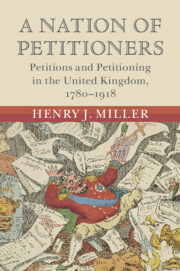Book contents
- A Nation of Petitioners
- Modern British Histories
- A Nation of Petitioners
- Copyright page
- Dedication
- Contents
- Figures
- Tables
- Acknowledgements
- Abbreviations
- Introduction
- Part I Petitions
- Part II Petitioners
- Part III Petitioning
- 7 The Practice of Petitioning
- 8 Mass Petitioning
- 9 Petitioning and Representation
- 10 Petitioning and Political Culture in an Age of Democratisation
- Conclusion
- Select Bibliography
- Index
Conclusion
from Part III - Petitioning
Published online by Cambridge University Press: 02 February 2023
- A Nation of Petitioners
- Modern British Histories
- A Nation of Petitioners
- Copyright page
- Dedication
- Contents
- Figures
- Tables
- Acknowledgements
- Abbreviations
- Introduction
- Part I Petitions
- Part II Petitioners
- Part III Petitioning
- 7 The Practice of Petitioning
- 8 Mass Petitioning
- 9 Petitioning and Representation
- 10 Petitioning and Political Culture in an Age of Democratisation
- Conclusion
- Select Bibliography
- Index
Summary
The conclusion summarises the key findings of the book. Not only were petitions and petitioning a central, and hitherto, missing component of our understanding of UK political culture, but these practices contributed to the transformation of political culture. The remainder of the conclusion considers how a study of petitionary culture reconnects and pushes forward the currently fragmented field of nineteenth-century political history, before considering three major implications of the book for the wider historiography. First, it demonstrates that UK political culture was even more inclusive than previously thought, thereby qualifying the emphasis on the exclusivity of the political nation. Second, it charts how the authority and legitimacy of the Commons in particular, and Parliament more generally, was renewed by petitions, although it could also, on occasion, be challenged by petitioners. Third, it shows how the UK state was transformed by the continuous interaction with petitioners, and restores the place of the people within accounts of the relationship between state and subjects. Ultimately, petitions and petitioning were part of a broader social phenomenon that decisively reshaped the modern political culture of the UK.
Keywords
- Type
- Chapter
- Information
- A Nation of PetitionersPetitions and Petitioning in the United Kingdom, 1780–1918, pp. 276 - 282Publisher: Cambridge University PressPrint publication year: 2023

